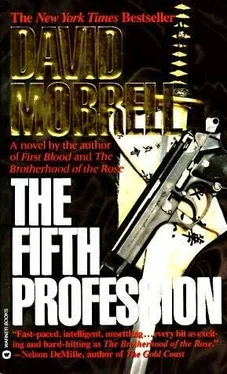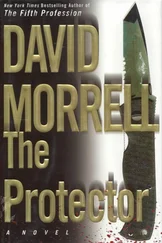David Morrell - The Fifth Profession
Здесь есть возможность читать онлайн «David Morrell - The Fifth Profession» весь текст электронной книги совершенно бесплатно (целиком полную версию без сокращений). В некоторых случаях можно слушать аудио, скачать через торрент в формате fb2 и присутствует краткое содержание. Жанр: Триллер, на английском языке. Описание произведения, (предисловие) а так же отзывы посетителей доступны на портале библиотеки ЛибКат.
- Название:The Fifth Profession
- Автор:
- Жанр:
- Год:неизвестен
- ISBN:нет данных
- Рейтинг книги:3 / 5. Голосов: 1
-
Избранное:Добавить в избранное
- Отзывы:
-
Ваша оценка:
- 60
- 1
- 2
- 3
- 4
- 5
The Fifth Profession: краткое содержание, описание и аннотация
Предлагаем к чтению аннотацию, описание, краткое содержание или предисловие (зависит от того, что написал сам автор книги «The Fifth Profession»). Если вы не нашли необходимую информацию о книге — напишите в комментариях, мы постараемся отыскать её.
The Fifth Profession — читать онлайн бесплатно полную книгу (весь текст) целиком
Ниже представлен текст книги, разбитый по страницам. Система сохранения места последней прочитанной страницы, позволяет с удобством читать онлайн бесплатно книгу «The Fifth Profession», без необходимости каждый раз заново искать на чём Вы остановились. Поставьте закладку, и сможете в любой момент перейти на страницу, на которой закончили чтение.
Интервал:
Закладка:
Yes. Like a cat, Savage thought. With less than nine lives.
“Know him?” he told Rachel as the yacht fought stormy waves to escape the harbor. “God help me, yes.”
“The wind! I can't hear you!”
“I saw him die six months ago!”
EXECUTIVE PROTECTION
1
Six months ago, Savage had been working in the Bahamas, an uneventful babysitting job that involved making sure the nine-year-old son of a U.S. cosmetics manufacturer didn't get kidnapped while the family was on vacation. Savage's research had made him conclude that, since the family had never been threatened, his assignment was really to be a companion to the boy while the parents abandoned him in favor of the local casinos. In theory, anyone could have served that function, but it turned out the businessman made frequent racial slurs against the local population, so Savage assumed that the supposed potential kidnappers had a skin color darker than his employer's. In that case, why, he'd wondered, had the businessman chosen the Bahamas at all? Why not Las Vegas? Probably because the Bahamas sounded more impressive when you told your friends you'd spent two weeks there.
Savage had disapproved but hadn't shown it. His job, after all, wasn't to like his client, but instead to provide security, and besides, despite his aversion to his employer, he enjoyed the boy's companionship extremely. While never allowing himself to be distracted from his duties, he'd taught the boy to windsurf and scuba dive. With the businessman's money, he'd chartered a fishing boat-captained by a Bahamian native, to Savage's rebellious delight-and never baiting a hook had shown the boy the graceful majesty of leaping sailfish and marlin. In short, he'd behaved like the father that the endearing boy's actual father should have been.
When the boy had flown back to Atlanta with his family, Savage had felt empty. Well, he'd thought, you've got this consolation. Not every job's as pleasant as this one. He'd remained in the Bahamas for three more days. Swimming, jogging, hardening his muscles. A vacation for himself. But then his habitual compulsion to work had taken control. He'd phoned one of his several contacts, a restaurateur in Barcelona, who'd received a call from a jeweler in Brussels, who passed the word that if Savage was available, his agent would be pleased to speak with him.
2
Savage's agent, Graham Barker-Smythe, the Englishman who'd trained him, had his home in a renovated carriage house in an elegant brick-paved lane in New York City, a half-block from Washington Square. As Graham liked to say, “At midnight, I can hear the junkies howl.”
Graham was fifty-eight, overweight from too much champagne and caviar, but in his lean youth, he'd been a member of the British military's elite commando unit, the Special Air Service, and after leaving the military, a protective escort to several prime ministers. Eventually his civil servant's income had been unacceptable compared to the guardian's fees he could earn in the private sector. America had offered the richest opportunities.
“This was after President Kennedy was shot. Then Martin Luther King. Then Robert Kennedy. Assassination was the major fear of anyone in power. Of course, the Secret Service had cornered the market on high-level politicians, so I chose to deal with prominent businessmen. They've got the bucks, and after the terrorists hit in the seventies, I made a bleeding fortune.”
Despite his twenty years in America, Graham still retained his English accent, though his vocabulary had become an intriguing mixture of American and British expressions.
“Some of the businessmen I protected”-Graham pursed his lips-“were no more than ruffians in Brooks Brothers suits. An elegant front. No class. Not like the aristocrats I used to work for. But this is what I learned. A protector has to repress his ill opinions about his employer. If you allow disapproval to control you, you'll unconsciously make a mistake that might kill your client.”
“You're saying a protector should never disapprove of a client?”
“It's a luxury. If we worked only for those of whom we approved, we'd seldom work. Everyone has imperfections. However, I do adhere to minimum standards. I would never help drug dealers, arms merchants, terrorists, mobsters, child molesters, wife beaters, or members of militant hate groups. I would never be able to repress my disgust enough to protect them. But unless you're confronted by unmistakable evil, you don't have a right to judge your client. Of course, you can still turn him down if the fee he offers is insufficient or the job too dangerous. Because we're tolerant doesn't mean we have to be schmucks. Pragmatism. Adapt to circumstances.”
Graham always enjoyed these philosophical discussions and despite his heart doctor's orders, indulged in lighting an enormous cigar, the smoke from which hovered above his bald head. “Did you ever wonder why I accepted you as a pupil?”
“I assumed because of the training I'd received in the SEALs.”
“That training was impressive, no doubt about it. When you came to me, I saw a strong young man accustomed to the stress of lethal conditions. A commendable background. Promising. Unrefined, however. I might even add, crude. Now don't look insulted. I'm about to give you a compliment. I grant that the SEALs are among the best commando units in the world, though my own SAS is of course in a class by itself.” Graham's eyes twinkled. “But the military insists on strict obedience, whereas an executive protector isn't a follower but a leader. Or more exactly, a protector exists in a delicate stasis with his employer, commanding yet obeying, allowing the client to do what he wants but insisting on how he does it. The relationship is known as symbiosis.”
Savage responded dryly, “I'm familiar with the word.”
“Give and take,” Graham said. “A protector requires the skills of a military specialist, agreed. But he also must have the talents of a diplomat. And above all, a mind. The latter-your mind-is what attracted me. You left the SEALs…”
“Because I disagreed with what happened in Grenada.”
“Yes, the U.S. invasion of that tiny Caribbean island. It's been several years since you approached me, but if my memory hasn't failed, the date of the invasion was October twenty-five, nineteen eighty-three.”
“Your memory never fails.”
“As a Briton, I'm instinctively precise. Six thousand U.S. soldiers-coordinated units of Rangers, Marines, SEALs, and Eighty-second Airborne paratroopers-attacked Grenada, their mission to rescue one thousand American medical students held captive by Soviet and Cuban troops.”
“Supposedly held captive.”
“You sound as angry as the day you came to me. You still feel the invasion wasn't justified?”
“For sure, there'd been trouble on the island. A coup had deposed the prime minister, but he was pro-Cuban, and the man who replaced him was Marxist. Different shades of red. The coup caused civil unrest. A hundred and forty protesters were shot by local soldiers. And the former prime minister was assassinated. But the American medical students stayed in their compound-none of them was injured. Basically two Communist politicians had fought each other for power. Why Americans were studying medicine on a pro-Cuban island I don't know, but the coup hardly threatened the balance of power in Latin America.”
“What about the Cuban, East German, North Korean, Libyan, Bulgarian, and Soviet technical advisors on the island, many of whom were actually soldiers?”
“An exaggeration of U.S. Intelligence. I saw only local soldiers and Cuban construction workers. Sure, when the invasion began, the Cubans grabbed rifles and fought as if they'd had military training, but what young man in Cuba hasn't had military training?”
Читать дальшеИнтервал:
Закладка:
Похожие книги на «The Fifth Profession»
Представляем Вашему вниманию похожие книги на «The Fifth Profession» списком для выбора. Мы отобрали схожую по названию и смыслу литературу в надежде предоставить читателям больше вариантов отыскать новые, интересные, ещё непрочитанные произведения.
Обсуждение, отзывы о книге «The Fifth Profession» и просто собственные мнения читателей. Оставьте ваши комментарии, напишите, что Вы думаете о произведении, его смысле или главных героях. Укажите что конкретно понравилось, а что нет, и почему Вы так считаете.












